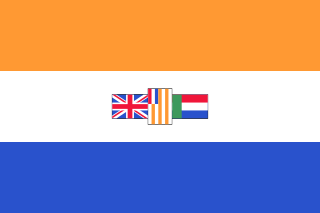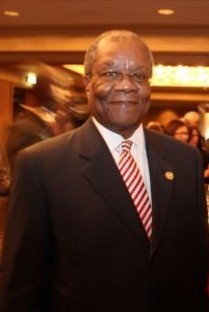John June Nquku (born 1899, date of death unknown) was an early Swaziland nationalist and creator of Swaziland's first political party, the Swaziland Progressive Party. [1]
John June Nquku (born 1899, date of death unknown) was an early Swaziland nationalist and creator of Swaziland's first political party, the Swaziland Progressive Party. [1]
Nquku was born in Pietermaritzburg, South Africa to a Zulu family. He went to Natal, South Africa and attended St. Chad's College before moving to Swaziland in 1930. [1] [2]
Nquku began his career as a principal, later becoming an inspector of Swazi schools. He resigned from the position in 1940, joining the Swazi National Council. [2] In 1944, Nquku became the secretary-general of the United Christian Church of Africa. In 1945, Nquku became President of the Swaziland Progressive Association, which then evolved into the Swaziland Progressive Party (SPP) in 1960. [2]
On May 18, 1961, [2] during a meeting to establish the constitution for Swaziland, Nquku was banished for having an unapproved and detrimental party. The following year, in February 1962, Nquku was deposed as party leader for allegedly corrupt and dictatorial practices. Ambrose Phesheya Zwane was elected to replace him. Later that year, in August 1962, Nquku was suspended from the SPP due to allegations of fraud, and was replaced by K.Y. Samketi. [3]
In 1963, Nquku regained his position as party leader of the SPP after being appointed by the secretary of the government. [3]
Outside of his political career, Nquku wrote multiple pamphlets which include a biography of the King of Swaziland Sobhuza II and a collection of folk tales in the Swazi language. [2]

Eswatini, officially the Kingdom of Eswatini and formerly named Swaziland, is a landlocked country in Southern Africa. It is bordered by Mozambique to its northeast and South Africa to its north, west, south, and southeast. At no more than 200 kilometres (120 mi) north to south and 130 kilometres (81 mi) east to west, Eswatini is one of the smallest countries in Africa; despite this, its climate and topography are diverse, ranging from a cool and mountainous highveld to a hot and dry lowveld.

Artifacts indicating human activity dating back to the early Stone Age have been found in the Kingdom of Eswatini. The earliest known inhabitants of the region were Khoisan hunter-gatherers. Later, the population became predominantly Nguni during and after the great Bantu migrations. People speaking languages ancestral to the current Sotho and Nguni languages began settling no later than the 11th century. The country now derives its name from a later king named Mswati II. Mswati II was the greatest of the fighting kings of Eswatini, and he greatly extended the area of the country to twice its current size. The people of Eswatini largely belong to a number of clans that can be categorized as Emakhandzambili, Bemdzabu, and Emafikamuva, depending on when and how they settled in Eswatini.

Mswati III is the king of Eswatini and head of the Swazi royal family. He was born in Manzini in the Protectorate of Swaziland to King Sobhuza II and one of his younger wives, Ntfombi Tfwala. He was crowned as Mswati III, Ingwenyama and King of Swaziland, on 25 April 1986 at the age of 18, thus becoming the youngest ruling monarch in the world at that time. Together with his mother, Ntfombi Tfwala, now Queen Mother (Ndlovukati), he rules the country as an absolute monarch. Mswati III is known for his practice of polygamy and currently has 15 wives.

Sobhuza II, was the Paramount Chief and later Ngwenyama of Swaziland for 82 years and 254 days, the longest verifiable reign of any monarch in recorded history. Sobhuza was born on 22 July 1899 at Zombodze Royal Residence, the son of Inkhosikati Lomawa Ndwandwe and King Ngwane V. When he was only four months old, his father died suddenly while dancing incwala. Sobhuza was chosen king soon after that and his grandmother Labotsibeni and his uncle Prince Malunge led the Swazi nation until his maturity in 1921. Sobhuza led Swaziland through independence until his death in 1982. He was succeeded by Mswati III, his young son with Inkhosikati Ntfombi Tfwala, who was crowned in 1986.
King Mswati II (Born:1820–Died:1868), also known as Mswati and Mavuso III, was the king of Eswatini between 1850 and 1868. He was also the eponym of Eswatini. Mswati is considered to be one of the greatest fighting kings of Eswatini.
Labotsibeni Mdluli, also known as Gwamile, was the Queen Mother and Queen Regent of Swaziland.

The People's United Democratic Movement is the largest opposition party in Eswatini. It is a democratic socialist party. Formed in 1983 at the University of Eswatini, it is led by Mlungisi Makhanya. The Swazi government has been monitoring PUDEMO closely since it launched the Ulibambe Lingashoni campaign, which aims for a "total liberation" of Eswatini, and has recently cracked down heavily on even small manifestations of support for PUDEMO, such as the death in custody of PUDEMO member Sipho Jele, who was arrested for wearing a PUDEMO t-shirt in May 2010.

KaNgwane was a bantustan in South Africa, intended by the apartheid government to be a semi-independent homeland for the Swazi people. It was called the "Swazi Territorial Authority" from 1976 to 1977. In September 1977 it was renamed KaNgwane and received a legislative assembly. After a temporary suspension of its homeland status during 1982, the legislative assembly was restored in December 1982. KaNgwane was granted nominal self-rule in August 1984. Its capital was at Louieville. It was the least populous of the ten homelands, with an estimated 183,000 inhabitants. Unlike the other homelands in South Africa, KaNgwane did not adopt a distinctive flag of its own but flew the national flag of South Africa.
Lobamba is a city in Eswatini, and is one of the two capitals, serving as the legislative, traditional, spiritual, seat of government of the Parliament of Eswatini, and Ludzidzini Royal Village, the residence of Queen Ntfombi, the Queen Mother.

Prince Barnabas Sibusiso Dlamini was a Swazi politician who served as Prime Minister of Eswatini, from 1996 to 2003 and again from October 2008 to September 2018.

iNgwenyama is the title of the male monarch of Eswatini. In English, the title is sometimes translated as King of Eswatini. The iNgwenyama reigns together with the Ndlovukazi, a spiritual leadership position held by the iNgwenyama's mother or another female royal of high status. The Ndlovukati may serve as a Regent if the position of Ngwenyama is vacant.

The Swaziland Progressive Party was the first political party founded in Swaziland.

Christianity is the dominant religion in Eswatini. The relative prevalence percentages vary by source. According to Pew Research, over 88% of the total 1.2 million population of Eswatini express Christianity to be their faith, over 0.2% express no affiliation. According to the US State Department religious freedom report of 2012, local religious leaders estimate that 90% of Eswatini's population is Christian, 2% are Muslim, while under 10% belong to other religious groups. According to the CIA World Factbook, the distribution is 40% Zionist, 20% Roman Catholic, other Christians 30%, 2% Muslim and 8% other religions. In other sources such as Clay Potts, the religious demographics are 80% Christian, and 20% Islam and Traditional Swazi religion.
Moses Mncane Mbheki Mabhida was a South African politician. Mabhida was leader of the South African Communist Party from 1978 until his death in 1986.
Hilda Beemer Kuper was a social anthropologist most notable for her extensive work on Swazi culture.
laNgolotsheni (Lomawa) Ndwandwe was the Ndlovukati of Swaziland, the wife of King Ngwane V, and the mother of King Sobhuza II.

Makila James is an American diplomat who has been a career Foreign Service Officer within the U.S. State Department. Beginning in 1988, she has had a series of postings and roles related to the Caribbean and Africa, leading to her being the Director of the Office of Caribbean Affairs from 2009 to 2012. She then served as the United States Ambassador to Swaziland from 2012 to 2016. Later, she was Deputy Assistant Secretary for East Africa and the Sudans from 2018 to 2020.
The United Swaziland Association (USA) was a political party that promoted interests of the Europeans in Swaziland. USA was founded in 1963. It was led by Willie Meyer.
Regina Gelana Twala was a feminist activist, writer, researcher, evangelist, and liberation leader in what is now eSwatini.